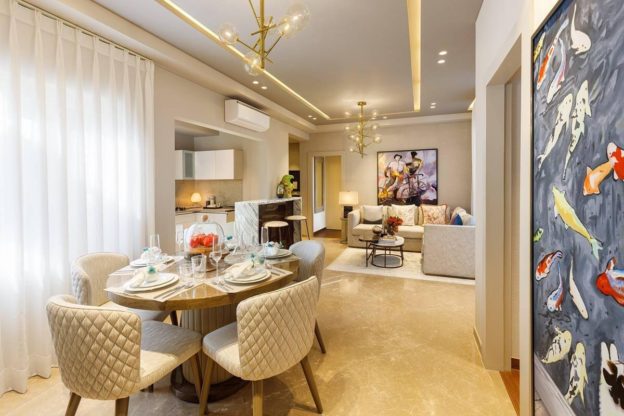The pandemic has further elevated the significance of owning a home instead of living in rented properties.
Amid work from home, people increasingly prefer spacious homes with a distinct workspace.
The COVID-19 pandemic has proved to be an inflexion point for the Indian economy. Real estate forms the backbone of the economy and is the second-largest employer after agriculture. Home has become the central pivot of our lives, a place of belonging and a haven for our daily pursuit. Since antiquity, purchasing a dream home has been considered a milestone in an individual’s life.
In the past few decades, the average age of a homebuyer has reduced to 30 years compared to 50 earlier. COVID-19 has further elevated the significance of owning a home instead of living in uncertainties in rented properties. An Anarock consumer sentiment survey highlighted that at least 37 per cent of participants intending to buy homes fall in the age bracket of 35-45 years. Another Anarock survey points out that 85% of buyers in NCR purchased their first homes between July 2020 and March 2021.
Real estate has also emerged as a stable asset class in the wake of diminishing lustre in alternative classes such as stocks, mutual funds, etc. Looking homewards, NRIs are increasingly seeking investment in realty in India owing to strong economic fundamentals.
Amid work from home, people increasingly prefer spacious homes with a distinct workspace. It has inevitably prompted the rethinking of the existing ticket sizes and configurations to accommodate an extra room as a study, storeroom or puja room. The 3-BHK and 2-BHK+study in dwellings are poised to remain sought-after assets as the hybrid model becomes a norm in the post-pandemic world.
Moreover, luxury housing catering to an affluent section of the society has remained resilient amid these unprecedented times. For a niche segment of society comprising corporate professionals, HNIs, UHNIs and NRIs, the benchmarks for sophistication remain unchanged despite economic volatility. This discerning segment of homebuyers seeks a luxurious lifestyle in meticulously crafted and aesthetically designed homes equipped with best-in-class amenities such as a gym, spa, clubhouse, tennis court, 24×7 security and surveillance, etc.
Self-sustained gated townships and condominiums are gaining traction among homebuyers amid travel restrictions and transmission concerns of the disease. With health and wellness taking centre stage, sustainability has found a new meaning. Homes set amid verdant greenery exemplifying a provision of optimum sunlight and ventilation, eco-friendly amenities such as rainwater harvesting, use of solar energy have emerged as sought-after assets. Location, aesthetics, quality of construction and developers’ credentials are among the key factors influencing homebuyers’ decisions.
Amid the blurring of geographical barriers, spacious homes located on the peripheries of cities, way from the hustle-bustle of the city, are gaining currency. Micro-markets such as New Gurgaon, etc., have emerged as realty hotspots bolstered by excellent connectivity and rapid infrastructural developments. Digitisation, leveraging cutting-edge technologies such as Artificial Intelligence, the Internet of Things, etc., to maximise customer experience are also among the dominant trends.
Furthermore, a Square Yards report points out that Gurugram has emerged as the most sustainable city to live in amid the pandemic due to low population density, high open area ratio, and higher number of healthcare institutions per unit area. The city is poised to dominate homebuyers’ preferences due to several policy initiatives by the Haryana government and upcoming large-scale infrastructural projects.
The buoyant economic activity and economic stability prospects augur well for the quick rebound of real estate by the last quarter of 2021. Nevertheless, regaining the faith of consumers will be crucial to push sales to pre-COVID levels. Customer-centricity and personalised offerings are expected to become key priorities for developers to maintain a competitive edge over their peers. Organised players with sound credentials will be better placed to navigate uncertainties due to their agile business models. The upcoming festive season has already rekindled hopes of an upsurge in residential demand. Bolstered by the policy push and strong economic fundamentals, real estate is poised towards a V-shaped recovery by Q4 2021.
https://www.financialexpress.com/money/covid-19-recalibrating-homebuyers-priorities-in-line-with-the-new-normal/2317353/







